Match Boxes, Vesta Cases
(c) Antique Metalware Society
Small extracts can be used with acknowledgements to 'Oldcopper.org' website.
Helpful comments are very welcome.
Vesta cases, vesta boxes, or pocket match safes or matchsafes were small portable boxes made in a great variety of forms with snapshut covers to contain vestas (short matches) and keep them dry. The name of the Roman goddess Vesta, was used by an early maker of strike-anywhere matches. Early matches were unreliable and prone to ignite from rubbing on one another or spontaneously so most people carried a match safe to house their matches. Each match safe had a ribbed or rough surface, usually on the bottom, for lighting the matches. Table models were made for convenience. The hobby of collecting match-related items, such as matchcovers and matchbox labels, is known as phillumeny. (edited from Wikipedia)
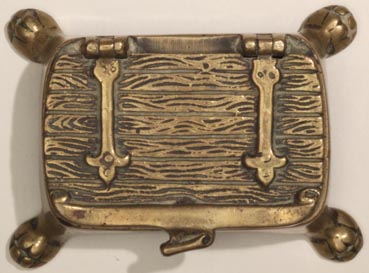 |
The broad topic of vesta cases is very well covered elsewhere. This page deals only with the history of one design for match boxes for tables produced in Birmingham from 1910 through to the 1970s by a firm later taken over by Peerage. |
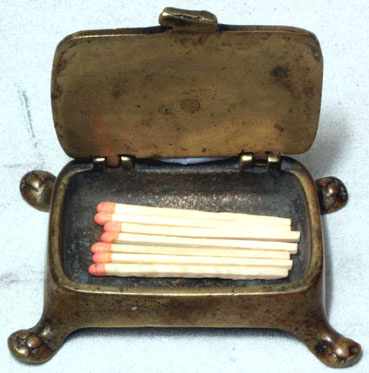 |
Initially designed in 1910, the use would then have been obvious. Later the design was used for souvenir boxes bearing any selected badge for local sale. Now they are often called ‘trinket boxes’, ‘ring boxes’ or even ‘snuff boxes’. |
| The boxes were marketed cheaply to hardware retailers as match boxes in dozens, either of one design or assorted designs. | The boxes were produced in two pieces using fine sand moulds made from durable patterns. The base with the four ‘lion’ feet was poured inverted so that the feet would act as feeders for the metal shrinkage as it solidified. This accounts for the depressions in the centre of each foot. The outsides were polished but the inside and base were left as cast with a rough surface that could serve for lighting matches. The underside frequently shows a design registration number. The lid has pairing projections for the working hinge and dummy hinge arms over a wooden-plank-effect top. Temporary inserts were used for each required design. The patterns would wear with time and have to be renewed occasionally. This gave the opportunity for design changes. |
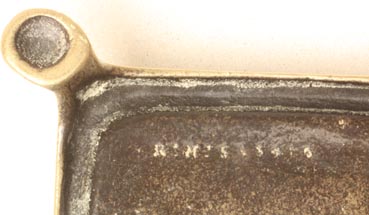 |
When readable, the first design commonly found bears a Design Registration Number (Rd No) of 572977. This was lodged by Pearson, Page, Newton & Minchew Ltd. Of Ernest Street, Holloway Head, Birmingham, brassfounders. On the 5th November 1910, extended 1915 and 1919. Newton and Minchew had worked in a small foundry in the same street occupied by the much larger firm of Townshend & Co., Ltd. |
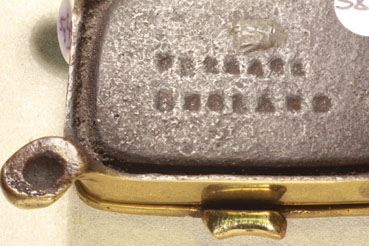 |
By 1910 they had been taken over by Pearson Page, later Pearson Page Jewsbury and later still known by the trade name 'Peerage'. |
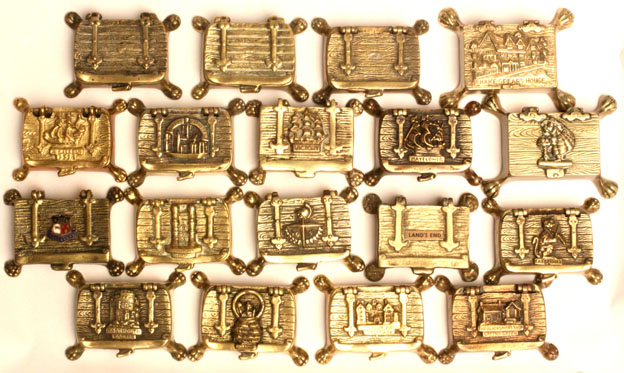
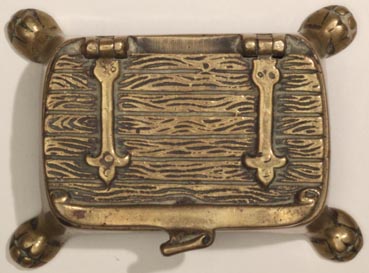 |
The original design |
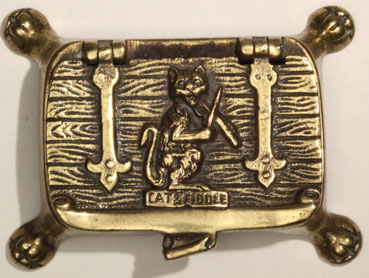 |
The 'Cat and Fiddle', the name of many inns, pubs and a road. |
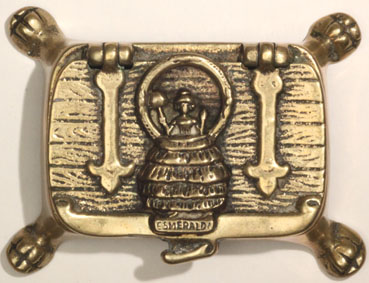 |
'Esmerelda' |
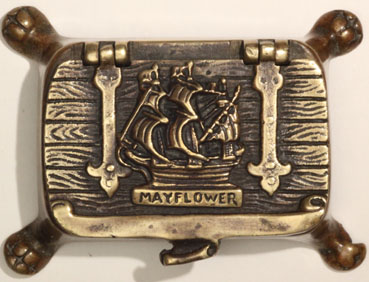 |
'Mayflower' the name of the ship that carried the Pilgrim Fathers'. |
| The original Newton & Minchew design has the hinges within the area of the box. There are seven planks to the top and dummy hinge straps. Between the straps the pattern could include any chosen emblem. The box itself was approximately 65 x 45mm (2 ½ x 1 ¾ “) and weighed around 185g (6 ½ oz.) | |
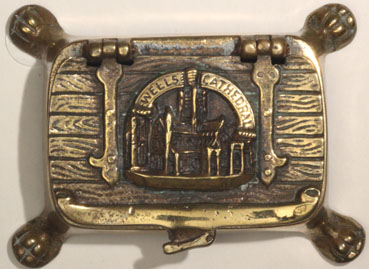 |
Wells Cathedral, Somerset. |
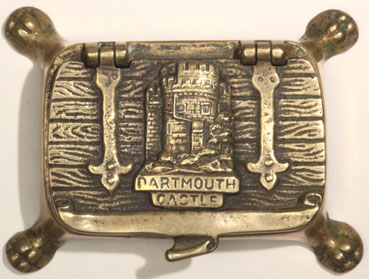 |
Dartmouth Castle, Devon. |
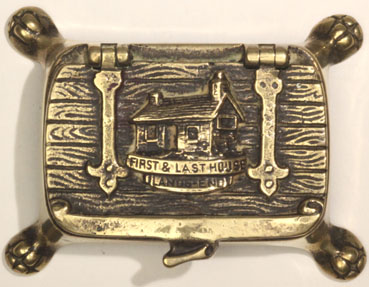 |
'First and Last House, Land's End, Cornwall. |
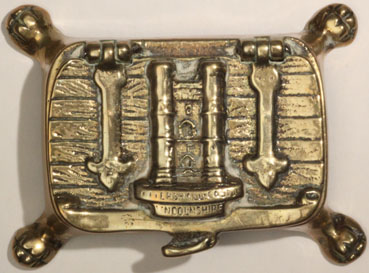 |
Tatershall Castle, Lincolnshire. |
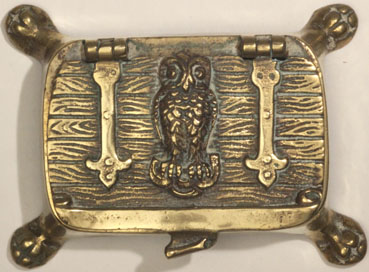 |
A wise old Owl. |
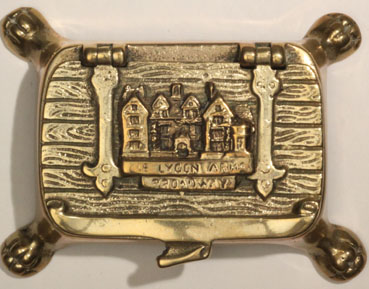 |
The 'Lygon Arms' hotel, Broadway in The Cotsolds. |
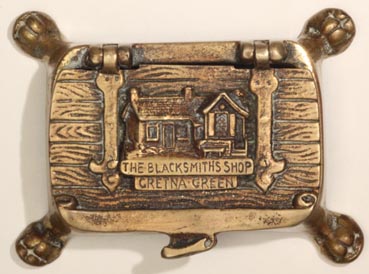 |
The Blacksmith's Shop, Gretna Green, just over the Scottish-English border North of Carlisle. |
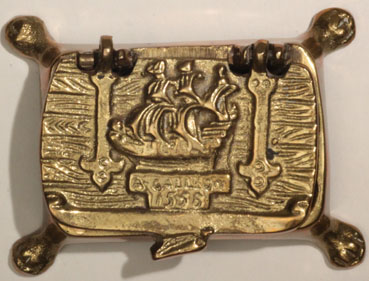 |
This one is a poor reproduction of 'A Galleon 1558'. It has been cast using an original as pattern and lost much detail, especially near the hinge. |
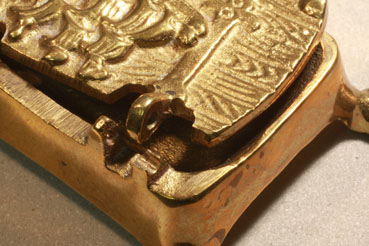 |
This must have been just a foundryman’s challenge. Since the initial value was low, about 15p equivalent at that time. Several have been seen over time. |
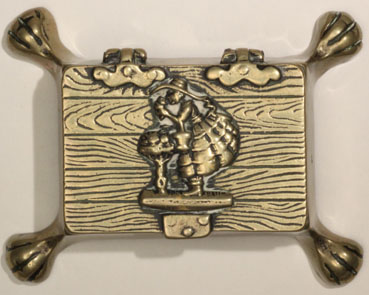 |
'Eserelda' again. A slightly bigger looking box design with squarer corners. The hinges protrude from the box and do not have the dummy straps. |
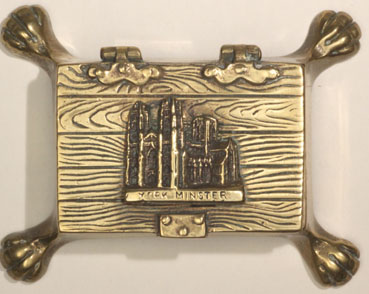 |
York Minster. Most of these examples show the registered design number of 762885 which dates from 1932. |
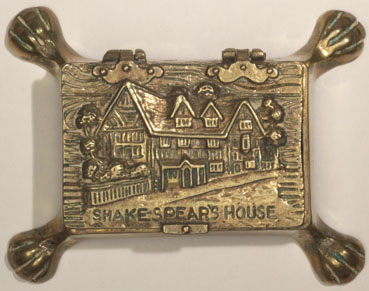 |
Shakespeare's House, Stratford-upon-Avon. It appears in the Pearson Page Jewsbury catalogue of that year as Gift Selection No 19195 ‘Cast Match Box’ with an assortment of charm ornaments at 36/- (shillings) per dozen or 30/- per dozen without ornament. |
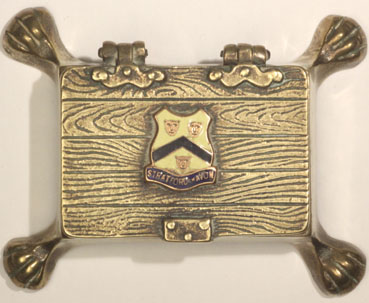 |
The arms of Stratford-upon-Avon |
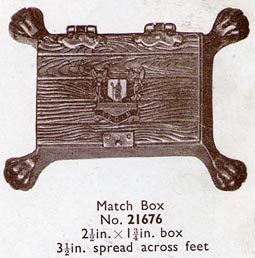 |
Individually (left) the boxes were 48/- per dozen. The box size is similar to those above but the feet are larger. Typically the boxes weigh up to 240g. 1951 catalogue, p39. |
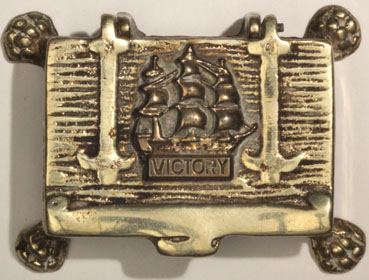 |
HMS Victory - see her pages. These three boxes are similar to the squarer ones described above but do have the hinge straps in the casting. |
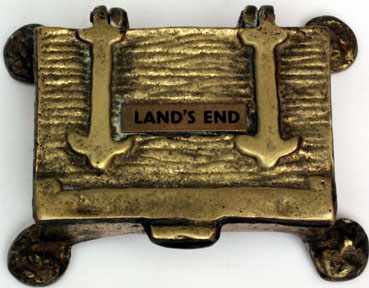 |
Land's End, Cornwall. |
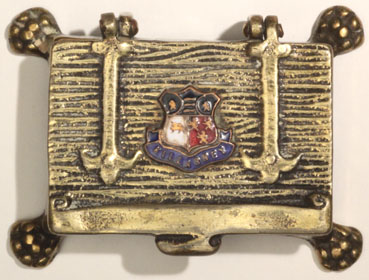 |
Two are not identified underneath but the 'Kilarny' badged example bears a cleaned area underneath and the wording 'Peerage Made in Ireland'. |
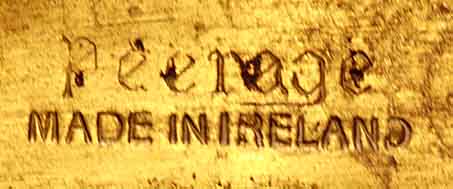 |
|
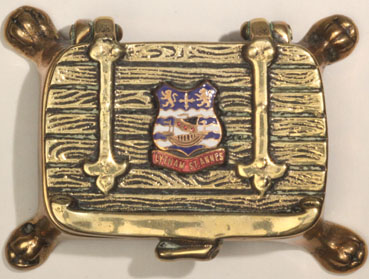 |
A later 'Kilarny'. These three boxes were perhaps the last design. They are similar to the original but have external hinges. |
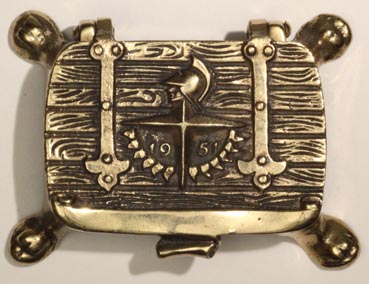 |
The one with the emblem of the Festival of Britain is positively dated to 1951.
|
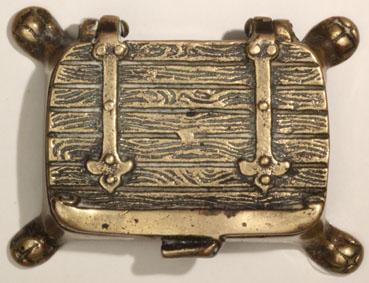 |
Underneath can be seen the later trade mark ‘Peerage England’. |
 w.jpg) |
The weight is down to c190g The lid interior is now polished, no longer a striker surface. |
After